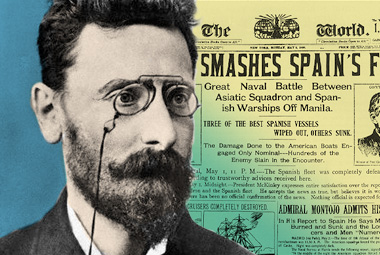Joseph J.Pulitzer was a newspaper publisher of the St. Louis Post-Dispatch and the New York World. He became a leading national figure in the Democratic Party and was elected congressman from New York. He crusaded against big business and corruption, and helped keep the Statue of Liberty in New York.
In the 1890s the fierce competition between his World and William Randolph Hearst’s New York Journal caused both to develop the techniques of yellow journalism, which won over readers with sensationalism, sex, crime and graphic horrors. The wide appeal reached a million copies a day and opened the way to mass-circulation newspapers that depended on advertising revenue (rather than cover price or political party subsidies) and appealed to readers with multiple forms of news, gossip, entertainment and advertising.
Today, his name is best known for the Pulitzer Prizes, which were established in 1917 as a result of his endowment to Columbia University. The prizes are given annually to recognize and reward excellence in American journalism, photography, literature, history, poetry, music and drama. Pulitzer founded the Columbia School of Journalism by his philanthropic bequest; it opened in 1912.
He was born(April 10, 1847 ) as Pulitzer József (name order by Hungarian custom) in Makó, about 200 km south-east of Budapest in Hungary, the son of Elize (Berger) and Fülöp Pulitzer. The Pulitzers were among several Jewish families living in the area, and had established a reputation as merchants and shopkeepers. Joseph’s father was a respected businessman, regarded as the second of the “foremost merchants” of Makó. Their ancestors emigrated from Moravia to Hungary at the end of the 18th century.
In 1853, Fülöp Pulitzer was rich enough to retire. He moved his family to Pest, where he had the children educated by private tutors, and taught French and German. In 1858, after Fülöp’s death, his business went bankrupt, and the family became impoverished. Joseph attempted to enlist in various European armies for work before emigrating to the United States.
Pulitzer arrived in Boston in 1864 at the age of 17, his passage having been paid by Massachusetts military recruiters who were seeking soldiers for the American Civil War. Learning that the recruiters were pocketing the lion’s share of his enlistment bounty, Pulitzer left the Deer Island recruiting station and made his way to New York. He was paid $200 to enroll in the Lincoln Cavalry on September 30.[6] He was a part of Sheridan’s troopers, in the First New York Lincoln Cavalry in Company L., where he served for eight months. Although he spoke three languages: German, Hungarian, and French, Pulitzer learned little English until after the war, as his regiment was composed mostly of German immigrants.
For six months during 1908, C. Louis Leipoldt, a South African doctor, writer, and poet, was Pulitzer’s personal physician aboard his yacht Liberty. While traveling to his winter home at the Jekyll Island Club on Jekyll Island, Georgia in 1911, Pulitzer had his yacht stop in Charleston Harbor, South Carolina. On October 29, 1911, Pulitzer listened to his German secretary read aloud about King Louis XI of France. As the secretary neared the end, Pulitzer said in German: “Leise, ganz leise” (English: “Softly, quite softly”), and died.His body was returned to New York for services, and he was interred in the Woodlawn Cemetery in The Bronx.
Legacy
In 1892, Pulitzer offered Columbia University’s president, Seth Low, money to set up the world’s first school of journalism. The university initially turned down the money. In 1902, Columbia’s new president Nicholas Murray Butler was more receptive to the plan for a school and journalism prizes, but it would not be until after Pulitzer’s death that this dream would be fulfilled.
Pulitzer left the university $2,000,000 in his will. In 1912 the school founded the Columbia University Graduate School of Journalism. This followed the Missouri School of Journalism, founded at the University of Missouri with Pulitzer’s urging. Both schools remain among the most prestigious in the world.
Pulitzer Prize
In 1917, Columbia organized the awards of the first Pulitzer Prizes in journalism. The awards have been expanded to recognize achievements in literature, poetry, history, music, and drama.
Legacy and honors
The U.S. Post Office issued a 3-cent stamp commemorating Joseph Pulitzer on the 1947 100th anniversary of his birth.
The Pulitzer Art Museum in Saint Louis was founded by his family’s philanthropy and is named in their honor.In 1989 Joseph Pulitzer was inducted into the St. Louis Walk of Fame.He is featured as a character in the Disney film Newsies (1992), in which he was played by Robert Duvall, and the Broadway stage production (Newsies) adapted from it which was produced in 2011.In the 2014 historical novel, The New Colossus, by Marshall Goldberg, published by Diversion Books, Joseph Pulitzer gives reporter Nellie Bly the assignment of investigating the death of poet Emma Lazarus.The Hotel Pulitzer in Amsterdam was named after his grandson Herbert Pulitze.Agency.(Photo collage by Tablet Magazine. Pulitzer photo: WikiCommons)






